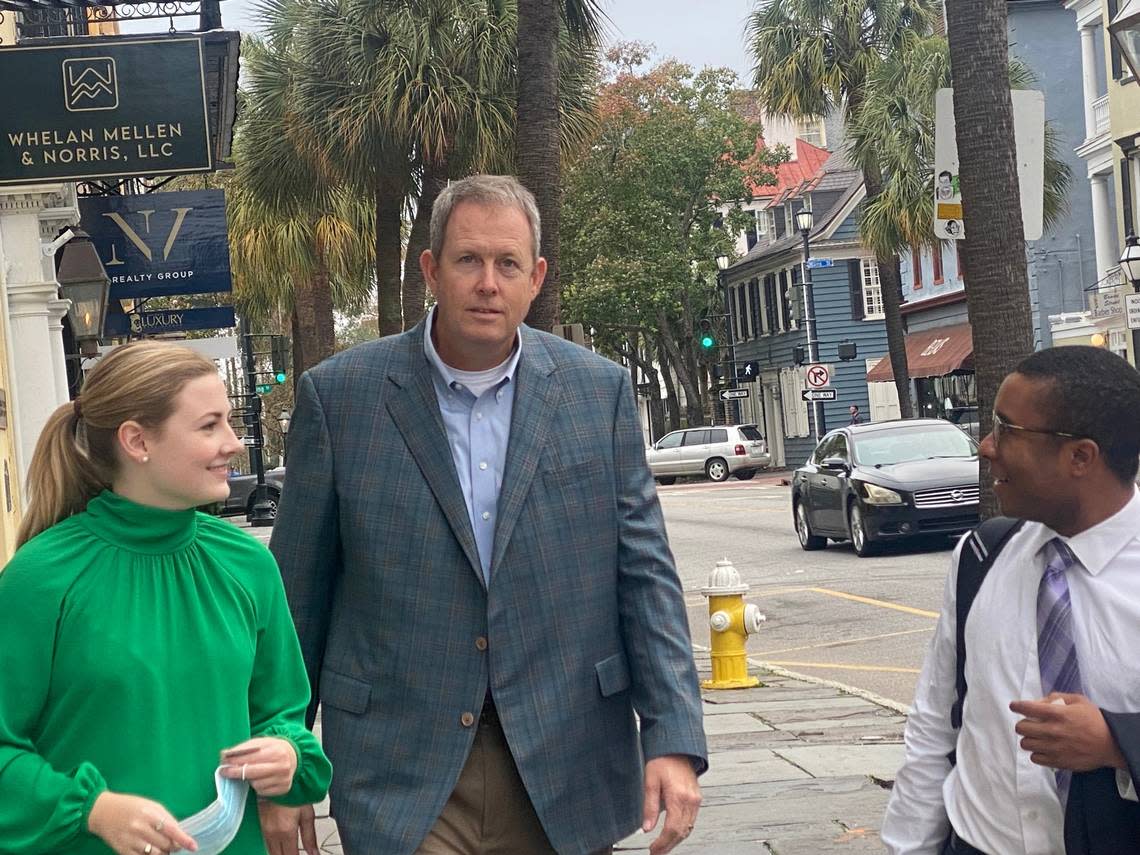Alex Murdaugh confessed to financial crimes, now Russell Laffitte wants a new trial

Former banker Russell Laffitte hopes to use Alex Murdaugh’s confessions on the witness stand to overturn his own convictions on six counts of bank fraud.
“Russell Laffitte never conspired with me to do anything,” Murdaugh said on the stand, as he admitted for the first time to a stunning array of thefts from his own clients and the law firm that his family founded.
But in relying on Murdaugh’s testimony, Laffitte is attempting to use the words of a recently convicted double murderer, whose practice of weaving elaborate webs of deceit was the subject of much of his trial for the killings of his wife and son.
The one-time CEO of the Palmetto State Bank, Laffitte has yet to be sentenced following the guilty verdicts in November 2022. He is facing up to 30 years in prison for conspiring with Murdaugh to misappropriate millions of dollars from the bank that the Laffitte family founded and ran for generations.
As a first time offender, he is expected to receive less than the maximum sentence.
The motion, filed Thursday in federal court, argues that admissions Murdaugh made while testifying in his own trial for the murders of his wife and son are new evidence that clears Laffitte of wrongdoing.
“Such evidence, if introduced at a new trial, would likely produce an acquittal,” the motion argues.
It is the first motion filed by Laffitte’s new lawyers, Mark Moore and Michael Parente, and comes just three days after U.S. District Court Judge Richard Gergel denied a motion by Laffitte’s previous legal team requesting a new trial.
The filing came the same day that Laffitte’s previous attorneys formally withdrew from the case, citing his “substantial failure to fulfill financial obligations.”
Under federal law, judges can sometimes grant a new trial under a range of circumstances, including when there is newly discovered evidence. Murdaugh’s testimony clearly showed that he “took full responsibility for his own actions... Mr. Laffitte did nothing wrong and did not have any knowledge of Mr. Murdaugh’s criminal activity,” the motion reads.
Laffitte’s motion states that many of the federal charges that Laffitte was convicted of — conspiracy to commit wire fraud, wire fraud, bank fraud and misapplication of bank funds — require that Laffitte had knowledge of and intent to commit the thefts.
Murdaugh’s testimony “clearly undercuts” the elements required to prove these crimes, the motion argues.
In a dramatic, and perhaps desperate, move during his own trial for the murder of his wife, Maggie, and son, Paul, Murdaugh admitted to decades of lies, thefts and manipulations while insisting that he was not guilty of the killings.
“I don’t dispute any of this, that I took money that didn’t belong to me, that I misled people… that trusted me to do that and that what I did was terrible. I don’t dispute that,” Murdaugh told prosecutor Creighton Waters during a grueling multi-hour cross examination.
Murdaugh refused to testify at Laffitte’s federal trial, citing his Fifth Amendment privilege against self-incrimination. He still faces over 90 charges across 15 different indictment for financial crimes.
But as Judge Clifton Newman sentenced Murdaugh on March 3, he questioned whether the disbarred lawyer would ever be able to stop lying. The jury “concluded that you continued to lie and lied throughout your testimony,” Newman told Murdaugh, as he sentenced the disbarred attorney to two consecutive life sentences without the possibility of parole.
When reached for a comment, Moore told The State Media Co. that the motion “speaks for itself.”
Throughout Murdaugh’s six-week trial, the jury heard exhaustive testimony about the lies Murdaugh told about his whereabouts the night of June 7, 2021, and the double life he constructed from a foundation of deceit: On the surface he was a successful, upstanding lawyer with deep familial connections to the Lowcountry community and law enforcement.
But secretly, he stole millions of dollars from his clients and the firm his family founded over a hundred years before in order to stay one step ahead of debts, cover up previous thefts and fund a $50,000 a week opiate pill habit.
Legal battle continues for Lafitte
Laffitte’s latest legal moves come amidst a series of shakeups and setbacks for him since he was convicted.
The new motion came the same day the attorneys who represented Laffitte at his federal trial, Bart Daniel, Matt Austin, and Josh Myers, of Nelson Mullins Riley & Scarborough LLP, formally withdrew as his attorneys.
In their notice informing the court that they would no longer be representing him, they stated that Laffitte failed to fulfill his “financial obligations to counsel for representation at trial and for post-trial relief.”
Lafitte has been formally represented by Moore, a former federal prosecutor, and his associate, Parente, since Jan. 1.
Daniels and Austin did not respond to a request to comment for this article. No explanation was provided for the delay between Moore and Parente taking over Laffitte’s defense and the filing of the notice to withdraw from the case.
In rejecting Laffitte’s initial appeal, Gergel wrote there was sufficient evidence to uphold each of the six counts of fraud against Laffitte. The ex-banker had “acted with reckless disregard for Palmetto State Bank’s interest,” and made various false representations to hide fraud, the judge wrote.
Laffitte’s attorneys also lost their bid in contending that Gergel acted wrongly when he made a last-minute decision to replace two sitting members of the jury with two alternates. In his ruling, Gergel acknowledged the substitution of two alternate jurors was unusual but “fair and reasonable under the circumstances.”
Moore and Parente both work for Columbia-based Nexsen Pruet.
Moore is a widely respected lawyer who has the reputation of being a tenacious legal pit bull, according to lawyers who have seen him in action. He is one of the few S.C. defense lawyers who has beaten federal prosecutors in a jury trial.
Journalist John Monk contributed reporting to this article.
